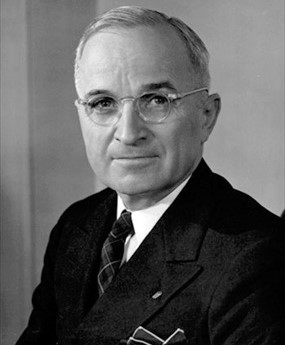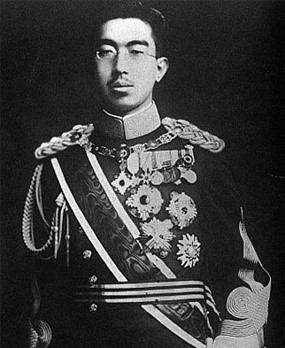ALLIES ISSUE JAPAN SURRENDER ULTIMATUM
Potsdam, Germany • July 26, 1945
After the conclusion of the ruinous Battle of Berlin (April 16 to May 2, 1945) and the unconditional surrender of Nazi Germany (May 7 and 8, 1945), U.S. President Harry S. Truman, British Prime Minister Winston Churchill, and Soviet dictator Joseph Stalin gathered at a “Big Three” victors’ conference in Potsdam. Their meeting in a Berlin suburb from July 17 to August 2 decided the postwar geopolitical and economic fates of European nations as well as that of Japan, the Axis power still fighting World War II. This Asian holdout was uppermost in Truman’s mind as he pondered how to get a commitment from the leader of the Soviet Union to join the U.S., Great Britain, and China in winding down the war as quickly as possible. For the moment the Allies were stymied in bringing Stalin on board by the 5‑year nonaggression pact Japan and the Soviet Union had entered into in 1941.
Separate from this conundrum, Truman and Churchill were keen on issuing a statement they and Chinese Nationalist leader Chiang Kai-shek could sign, summarizing the terms and conditions as the 3 saw it for their adversary’s unconditional surrender. Securing Chiang’s signature took a good week. Late on this date, July 26, 1945, the Potsdam Declaration (known after its place of “publication”) was broadcast to the world in English, then Japanese. Over the next few days 3 million leaflets that described the Allies’ terms were airdropped over Japan. Truman and Churchill purposely kept Stalin ignorant of the wording of the Potsdam Declaration (after all, his nation was a noncombatant), while secretly knowing that Stalin would declare war on Japan on August 15 “with no strings attached,” as Truman remarked to his wife on July 18, a day after learning of the Soviets’ decision to enter the war. The 2 Western leaders also knew that on July 16 their joint Manhattan Project had exploded an atomic bomb of the sort that could be unleashed over Japan from August 1 onward. Its use might accelerate Japan’s capitulation before Soviet armies could intervene, thus saving millions of combatants’ lives as well as those of civilians.
The Potsdam Declaration was a final ultimatum to force Japan to accept the Allies’ unconditional surrender demands. By now Japan’s defeat was not an issue: its armed forces were whipped, yet they were estimated to still be lethal for upwards of another year or more. The sticking point for Japan’s war leaders was the status of Shōwa Emperor Hirohito, whom Truman initially wanted removed in a postwar Japan. A Gallup Poll in June 1945 sided with Truman: just 7 percent thought Hirohito should keep his thrown, while a good third wanted him executed as a war criminal.
In its final iteration the Potsdam Declaration was ambiguous enough over the emperor’s postwar fate that Hirohito found it “acceptable in principle.” Ignoring the signatories’ warning—“We shall brook no delay”—Prime Minister Kantarō Suzuki stated at a press conference that the declaration was nothing more than a rehash of old proposals and, as such, beneath contempt. He would “kill (it) with silence (mokusatsu),” he said. Truman, hearing nothing back, carried out the declaration’s threat of “prompt and utter destruction” by ordering the bombing of 2 Japanese cities, Hiroshima and Nagasaki, on August 6 and 9, 1945, using what he called “the most terrible bomb in the history of the world” (Truman’s diary entry for July 25). On August 9 the Soviets dropped the final hammer by declaring war on Japan. Five days later Hirohito surrendered his country.
Japan 1945: Living on Borrowed Time
 |  |
Left: For a brief while President Truman (1884–1972) seemed betwixt and between over his decision to use the atomic bomb on America’s last World War II adversary. The day after he ordered Hiroshima obliterated, Truman confessed: “For myself I certainly regret the necessity of wiping out whole populations because of the ‘pigheadedness’ of the leaders of a nation, and . . . I am not going to do it unless absolutely necessary.” Two days after ordering Nagasaki’s destruction, Truman had no regrets: “The only language they [the Japanese] seem to understand is the one we have been using to bombard them. When you have to deal with a beast you have to treat him as a beast.” Looking back, Truman neither shirked personal responsibility for his decision to be the only U.S. president to authorize use of a nuclear weapon nor did he apologize for it.
![]()
Right: Emperor Hirohito (1901–1989) was not directly mentioned in the Potsdam Declaration. The closest the declaration came to stating the obvious wish of the victors, which was the removal of bad actors from the political and military stages after the war, was Paragraph 6: “There must be eliminated for all time the authority and influence of those who have deceived and misled the people of Japan into embarking on world conquest.” At dawn on August 10, 1945, 1 day after the Nagasaki bombing and the entry of the Soviet Union into the Pacific War, the Japanese Foreign Ministry, through the Swiss government, informed the U.S. State Department that the Japanese government was ready to accept the terms enumerated in the Potsdam Declaration “with the understanding that the said declaration does not compromise any demand which prejudices the prerogatives of His Majesty as a Sovereign Ruler.” Secretary of State James Byrnes responded: “From the moment of surrender the authority of the Emperor and the Japanese Government to rule the state shall be subject to the Supreme Commander of the Allied Powers.” Hirohito was unwavering in his commitment to ending the war immediately and prepared himself for a worst-case scenario in which he might be arrested by the victors, even tried and executed as a war criminal. Hirohito kept his throne and his skin as he and Japan’s postwar government developed a well-working relationship with the soft-handed approach of the Supreme Commander for the Allied Powers Gen. Douglas MacArthur, who handed over power to the Japanese government in 1949.
Potsdam Conference: Truman, Churchill, Stalin in Berlin, June 1945
![]()

 History buffs, there is good news! The Daily Chronicles of World War II is now available as an ebook for $4.99 on Amazon.com. Containing a year’s worth of dated entries from this website, the ebook brings the story of this tumultuous era to life in a compelling, authoritative, and succinct manner. Featuring inventive navigation aids, the ebook enables readers to instantly move forward or backward by month and date to different dated entries. Simple and elegant! Click
History buffs, there is good news! The Daily Chronicles of World War II is now available as an ebook for $4.99 on Amazon.com. Containing a year’s worth of dated entries from this website, the ebook brings the story of this tumultuous era to life in a compelling, authoritative, and succinct manner. Featuring inventive navigation aids, the ebook enables readers to instantly move forward or backward by month and date to different dated entries. Simple and elegant! Click 











